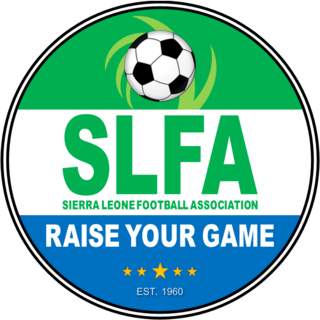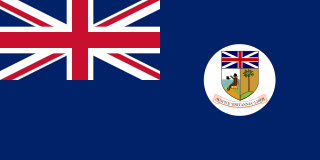
Sierra Leone, officially the Republic of Sierra Leone, is a country on the southwest coast of West Africa. It shares its southeastern border with Liberia and is bordered by Guinea to the north. With a land area of 71,740 km2 (27,699 sq mi), Sierra Leone has a tropical climate and with a variety of environments ranging from savannas to rainforests. According to the 2015 census, Sierra Leone has a population of 7,092,113, with Freetown serving as both the capital and largest city. The country is divided into five administrative regions, which are further subdivided into 16 districts.

Freetown is the capital and largest city of Sierra Leone. It is a major port city on the Atlantic Ocean and is located in the Western Area of the country. Freetown is Sierra Leone's major urban, economic, financial, cultural, educational and political centre, as it is the seat of the Government of Sierra Leone. The population of Freetown was 1,055,964 at the 2015 census.

The Mende are one of the two largest ethnic groups in Sierra Leone; their neighbours, the Temne people, constitute the largest ethnic group at 35.5% of the total population, which is slightly larger than the Mende at 31.2%. The Mende are predominantly found in the Southern Province and the Eastern Province. The Mende are mostly farmers and hunters. Some of the major cities with significant Mende populations include Bo, Kenema, Kailahun, and Moyamba.

Sierra Leone competed at the 2004 Summer Olympics in Athens, Greece, from 13 to 29 August 2004. This was the nation's eighth appearance at the Summer Olympics since its debut in the 1968 Summer Olympics. The Sierra Leone delegation included two track and field athletes; Lamin Tucker and Hawanatu Bangura, both of whom were sprinters that were selected via winning an event in Freetown, as the nation had no athletes that met the "A" or "B" standards in any event. Bangura was selected as flag bearer for the opening ceremony. Neither of the two athletes progressed beyond the heats.

The Sierra Leone national football team represents Sierra Leone in association football and is governed by the Sierra Leone Football Association. It has qualified for Africa Cup of Nations three times.

Julius Maada Wonie Bio is a Sierra Leonean politician who has served as president of Sierra Leone since 4 April 2018. He is a retired brigadier in the Sierra Leone Army and was the military head of state of Sierra Leone from 16 January 1996 to 29 March 1996, in a military junta government known as the National Provisional Ruling Council (NPRC).
The Sierra Leone Civil War (1991–2002), or the Sierra Leonean Civil War, was a civil war in Sierra Leone that began on 23 March 1991 when the Revolutionary United Front (RUF), with support from the special forces of Liberian dictator Charles Taylor's National Patriotic Front of Liberia (NPFL), intervened in Sierra Leone in an attempt to overthrow the Joseph Momoh government. The resulting civil war lasted almost 11 years, and had over 50,000, up to 70,000, casualties in total; an estimated 2.5 million people were displaced during the conflict.

Ernest Bai Koroma is a Sierra Leonean politician who served as the fourth President of Sierra Leone from 17 September 2007 to 4 April 2018.

The Sierra Leone national cricket team is the men's team that represents Sierra Leone in international cricket. They became an affiliate member of the International Cricket Council (ICC) in 2002 and an associate member in 2017.
Prostitution in Sierra Leone is legal and commonplace. Soliciting and 3rd party involvement are prohibited by the Sexual Offences Act 2012. UNAIDS estimate there are 240,000 prostitutes in the country. They are known locally as 'serpents' because of the hissing noise they use to attract clients.

The Dominion of Sierra Leone was an independent sovereign state with Queen Elizabeth II as its head of state between independence on 27 April 1961 and becoming the Republic of Sierra Leone on 19 April 1971.
The Sierra Leone women's national football team is governed by the Sierra Leone Football Association.

Human rights in Sierra Leone are in a rather deplorable state, but have improved gradually since the end of its civil war in 2002. Among the major human-rights problems in Sierra Leone today, according to a 2011 U.S. State Department report, are "security force abuse and use of excessive force with detainees, including juveniles; harsh conditions in prisons and jails; official impunity; arbitrary arrest and detention; prolonged detention, excessive bail, and insufficient legal representation; interference with freedom of speech and press; forcible dispersion of demonstrators; widespread official corruption; societal discrimination and violence against women, discrimination based on sexual orientation; female genital mutilation (FGM); child abuse; trafficking in persons, including children; and forced child labor".

Sierra Leone, officially the Republic of Sierra Leone, is a Constitutional Republic in West Africa. Since it was founded in 1792, the women in Sierra Leone have been a major influence in the political and economic development of the nation.

Visitors to Sierra Leone must obtain an e-Visa unless they are citizens of one of the visa-exempt countries or citizens who may obtain a visa on arrival.

Sierra Leone was planning to participate at the 2014 Summer Youth Olympics, in Nanjing, China, but on 13 August 2014 they pulled out of the games due to pressure from Chinese Authorities in an attempt to prevent Ebola from West Africa from entering their nation.

The Colony and Protectorate of Sierra Leone was the British colonial administration in Sierra Leone from 1808 to 1961, part of the British Empire from the abolitionism era until the decolonisation era. The Crown colony, which included the area surrounding Freetown, was established in 1808. The protectorate was established in 1896 and included the interior of what is today known as Sierra Leone.

The Sierra Leone women's national cricket team represents the country of Sierra Leone in international women's cricket.

Sierra Leone remained a British colony throughout World War II. As such, it fought alongside the Allies against the Axis. No large scale battles or military action took place in or around Sierra Leone during the war. However, the colony played a critical role in supporting the Allies throughout the conflict, with Freetown acting as an important convoy station.










